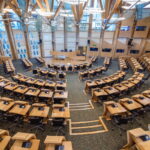Five years inside Scotland’s political machine
“Faith without works is dead.” — James 2:26
FOR FIVE YEARS I’ve lived inside the slow, grinding process of trying to turn compassion into law. On Thursday, that work was voted down.
This is what really happened and what it’s taught me about politics, power, and faith in modern Scotland.
The Vote
On Thursday afternoon, I wasn’t in the chamber. I was sitting in a small office nearby with two women one still working but just about to retire, one long retired both veterans of the Scottish Parliament since the day it opened.
These were women who’ve seen every kind of political drama there is. But as the results appeared 52 for, 63 against, 0 abstentions, 14 not voting.
One of them finally said, “My God, what have we become?”
That’s how I’ll remember it. Not outrage or shock. Just despair quiet, seasoned, weary despair from people who once believed Scotland could do better than this.
And just like that, five years of work five years of meetings, consultations, and hope dissolved in a single line on a parliamentary screen.
The Right to Recovery Bill was meant to give every person seeking help for addiction the legal right to treatment. Not a request.Not a waiting list. A right.
And on Thursday, Parliament chose to say no.
There were no boos or protests. Just polite applause, as if another “difficult decision” had been made. But to those of us who live and work in the wreckage of this crisis, it wasn’t difficult at all. It was devastatingly simple: the people in charge chose to keep things exactly as they are.
Five years ago, when we first began shaping the Bill, we took it straight to the SNP not the Tories, not Labour, the SNP. We wanted this to be Scotland’s Bill: a unifying piece of legislation that rose above party flags and proved we could still do the right thing for the right reasons.
They refused. We also took it to the SNP-funded quangos naïvely, as it turns out hoping they might carry it forward because we were too small. They said, “Don’t call us, we’ll call you.”
From that moment, I began an education in how politics in Scotland really works not the glossy version of “consultation and collaboration,” but the tribal, risk-averse, self-protective version that eats reformers alive. I learned how committees can be stacked, how evidence can be “interpreted,” and how entire movements can be rebranded overnight if it suits the right narrative.
I also learned that once you start speaking plain truth about treatment, about failure, about recovery, the system doesn’t debate you it smears you.
In the years since, I’ve endured three-day migraines, the constant stress of running a national charity, and an unending stream of online abuse from people who’ve never met me but feel entitled to decide what my motives must be. It’s been a lesson in human frailty and my own But I’m still here. Still standing. Because the people who died waiting for treatment can’t be.
This Bill wasn’t perfect. No Members’ Bill ever is. That’s what Stage 2 is for to fix, amend, refine. But killing it at Stage 1 wasn’t about detail; it was about control. It shut down a debate that was getting far too close to the truth: that our so-called “world-leading” approach to drugs policy is, in reality, a bureaucratic carousel that keeps the same people in power while the same people die.
They call it compassion.
I call it cowardice.
And so here we are a Parliament that congratulates itself on inclusion while excluding every voice that doesn’t toe the line. A government that funds “lived experience” groups to echo its agenda while chastising and smearing the ones who speak freely. A system that finds money for slogans but not for detox beds.
What they killed yesterday wasn’t just a Bill; it was a chance for redemption.
How It Started
The Right to Recovery Bill wasn’t born in a policy lab or dreamed up by a politician looking for a headline. It came from years of listening, really listening to people who were desperate for help and had nowhere left to turn.
The architects of this Bill sat with mothers who phoned every number they could find, begging for a bed for their child and being told, “There’s nothing available.” We’ve stood beside fathers who spent their savings on private detox because they couldn’t bear to wait for a call that never came. And we’ve buried too many friends whose only mistake was asking for help from a system designed to manage addiction, not end it.
That’s why we began drafting the Bill: to put into law something that should already exist a clear, legal right for people seeking help with addiction to access the full range of treatment options: detox, rehab, aftercare, housing, family support. Not just a prescription and a pat on the head.
We didn’t care who got the credit. That’s why our very first meeting was with the SNP. We wanted them to lead it, to own it, to prove that compassion in government could still mean action. I’ll never forget sitting in that first meeting thinking, They’ll surely get this.
They didn’t.
What came next was five years of polite nods, procedural delays, and promises of “further consideration.” Every door that closed was wrapped in kind words. The message was always the same: We care but not enough to do anything that might rock the boat.
So we took the proposal elsewhere. To anyone who would listen. To every party that claimed to care about equality, justice, or public health. That’s how Douglas Ross ended up sponsoring it not because this was some cynical “Unionist stunt,” but because he was the only one who said, “Yes, let’s give people the right to get well.”
The irony, of course, is that the very people who now call the Bill “politically motivated” could have had their name on it from day one. They chose not to and then had the audacity to accuse others of playing politics.
That’s when I realised what I was up against: not bad people, necessarily, but a political culture that fears change more than it fears failure.
In Scotland, failure is comfortable. It’s managed. It’s budgeted for. And when you dare to disrupt that equilibrium, you’re not met with debate you’re met with dismissal.
That was the start of the education I never asked for: how politics actually works when you’re not part of the club.
The System Fights Back
Once the Bill was lodged, the machine started moving not to help, but to contain.
From the outside, the Scottish Parliament’s committee process looks democratic: open calls for evidence, public sessions, expert witnesses, lively debate. Inside, it’s more like a polite execution.
The committees decide which voices get amplified and which get ignored. The “experts” invited to give evidence are often the same people who designed the current system, the one that has presided over record drug deaths for more than a decade. Imagine letting the arsonists review the fire code.
We submitted written evidence from people in long-term recovery, families, and practitioners, all saying the same thing: access to treatment in Scotland is a postcode lottery; detox and rehab are almost impossible to get; bureaucracy kills. Those voices barely made the minutes.
Meanwhile, every quango, government-funded “lived experience” group, and policy contractor suddenly discovered their own “concerns.” The phrasing was identical you could see the cut-and-paste marks: “uncosted,” “unnecessary,” “too prescriptive,” “a blunt instrument,” “promotes abstinence over harm reduction,” “risks stigmatising people not ready to recover.”
All the buzzwords were there, polished and pre-approved. The same organisations that have presided over record deaths were suddenly worried about efficiency, flexibility, and tone. It would be funny if it weren’t fatal.
Translation: it threatened their control.
Then came the predictable theatre. Committee members solemnly announced that, while they “fully supported the intention,” they couldn’t possibly endorse the Bill “in its current form.” That’s the Scottish policy version of “bless your heart.”
Stage 2 the very point at which a Bill is meant to be tested, amended, and improved was waved away as an inconvenience. Killing it early was tidier. It allowed everyone to look principled while ensuring nothing actually changed.
The truth is, we’d already exposed too much. Our evidence had begun peeling back the veneer of competence, revealing just how deeply the system had failed. They couldn’t risk letting that debate reach Stage 2 because once daylight hit those failures, there’d be no putting the mask back on.
They rebranded opposition as “evidence-based consensus.” The same publicly funded organisations that depend on government grants were trotted out as independent voices.
This is how the system defends itself: with smiles, forms, and procedural niceties. No need for corruption when conformity does the job.
And what did it reveal? That recovery, real recovery terrifies the bureaucratic class. Because recovery means independence. It means people who no longer depend on the system, and that’s a dangerous thing for those whose livelihoods depend on managing dependency.
In one sense, I can’t even blame them. They’re doing what systems do protecting themselves. But let’s not dress it up as compassion. When you block a law that could save lives because it might inconvenience a few “delivery partners,” you’re not protecting democracy. You’re protecting a pay cheque.
The committees did their job not to test the Bill, but to bury it neatly.
The Media: Megaphone and Maze
But Parliament wasn’t the only arena where this battle played out. Outside the chamber, another machine was spinning its own version of events, the media.
For most of this journey, the press were with us. Many journalists amplified the voices of families and people in recovery with care and courage. They gave space to the simple truth at the heart of the Bill, that treatment should be a right, not a raffle, and they did it without sensationalising grief. I’m grateful for that. It mattered.
But the media is also a maze. Alongside principled reporting, there were outlets and commentators playing their own political games: framing stories to wound opponents, trimming nuance to fit a tribal script, lifting lines out of context to feed the 24-hour outrage cycle. Anonymous briefings from government and its satellites were recycled as “balance.” Leaks appeared to shape committee mood. Headlines sometimes arrived before facts.
We tried to walk through that pool with grace and awareness. A few simple rules guided us:
- Tell the truth, then stop. No embroidery, no convenient exaggerations. If we didn’t know, we said so.
- Protect the vulnerable. We platformed families and people in recovery with consent, care, and preparation, never as props.
- Don’t trade access for silence. We corrected inaccuracies, even when it risked a relationship.
- Refuse the pile-on. We didn’t punch down at individuals; we critiqued systems.
- Choose principle over clicks. When a framing invited us to attack for sport, we declined. Dignity first.
That’s the standard we tried to carry into every interview and every statement. We’re not against the press, we’re against using human suffering as a partisan chew toy. When reporters did the hard work reading the detail, challenging power, centring lived experience without exploiting it, we said thank you, and we meant it. When others tried to drag us into their war, we stepped aside and let the facts speak.
The media can be a megaphone or a mirror. At their best, Scottish journalists helped the country see itself clearly. At their worst, some simply echoed the loudest spin in the room. Our task was to keep faith with the truth in front of us, and to move through the noise with grace.
The Myth of Consultation
If you’ve never been through an official government “consultation,” you might imagine it’s a fair, open process where every voice counts. It’s not. It’s theatre carefully choreographed to produce the right answers.
When the Right to Recovery consultation opened, we were told it would “give everyone a chance to contribute.” In reality, it gave everyone a chance to tick boxes. The real decisions had already been made in the corridors between ministerial offices and the same handful of organisations that always get called first.
You can spot them a mile off the “usual suspects” who appear on every working group, every steering panel, every glossy strategy document. The quango class. They speak fluent policy jargon and always have a pilot project ready to present. They know how to say “whole-systems approach” and “cross-sectoral collaboration” while avoiding the words detox, rehab, or choice.
The government calls them partners. I call them gatekeepers.
They control the narrative, and their funding depends on keeping it that way. They attend consultation events paid for by the very departments they’re meant to scrutinise, and their “independent responses” become the evidence ministers cite to justify doing nothing. It’s a beautiful back-slapping loop if you ignore the death toll.
Grassroots recovery groups, families, and people with lived experience of getting well rather than managing use are either co-opted or treated like a nuisance. Invitations arrive late, speaking slots are cut short, or you’re told there’s “no budget” to support your attendance.
It’s not consultation; it’s choreography, how the state performs empathy while preserving control.
During the Bill process, we watched as genuine recovery voices were quietly sidelined and replaced with sanitised, government-approved versions of “lived experience.” The kind that never criticise policy, never ask awkward questions, and always remember to thank the Minister loudly on social media.
That’s when I realised something chilling: in Scotland, we no longer have a recovery movement we have a recovery industry. It didn’t happen by accident. The government split the movement in two, hijacked the language of recovery, stripped it of its soul, and used it to promote cheaper, tokenistic practices. Then it co-opted and steered naïve or ambitious voices to do its dirty work. I’m told this is inevitable and has always been so in every area not just ours.
Consultation has become a ritual of self-congratulation. It allows politicians to say “we listened” while ensuring nothing truly challenging survives the edit.
And yet, even within that stage-managed process, 80 per cent of public respondents supported the Bill. That’s how powerful the truth is even a rigged system couldn’t hide it completely.
But the machine simply reinterpreted that support as “misunderstanding.” We were told the public “didn’t grasp the complexity.” Imagine that the people living through the consequences of this system deemed too naïve to understand it.
Consultation, Scottish-style, is a mirror that only reflects the faces already in the room.
The Human Cost
The public sees the headlines, the votes, the soundbites but they don’t see what it costs to stay in this fight.
For the last three years, I’ve lived with three-day migraines, stress that wakes me before dawn, and the constant ache of carrying a responsibility I never asked for but can’t put down.
I’ve been shouted at, lied about, and insulted by people who’ve never met me, people who think Twitter is truth and slander is activism. I’ve been accused of political opportunism by folk whose own careers depend on keeping things broken.
And then there are the people I have met colleagues, old friends, allies who let envy rot them from the inside until they couldn’t bear to see someone else stand up and speak. Their resentment has gone from whispers to outright sabotage. That’s the part that hurts most. I expected opposition from government. I didn’t expect cruelty from the sidelines.
The truth is, this fight has made me unemployable in the very sector I’ve given my life to. Every time I speak publicly, another door quietly closes. And yet I can’t stop. I can’t stop because every week I hear of another young person dead, another parent broken, another community giving up hope.
There’s no salary high enough, no platform big enough, to make this worth what it’s cost me personally. But there is a calling.
I’m a Catholic. I believe in service, in truth, in the dignity of every human life. And I believe that faith without works is dead, that love isn’t a feeling, it’s an act of will.
That’s what keeps me upright when I want to quit. That’s why I still walk into rooms where I’m unwelcome, still speak into microphones that feed back static, still write when I’m exhausted.
Because the people dying on our streets aren’t data points they’re souls. They’re children of God, each one irreplaceable. And if I don’t fight for them, who will?
I often think about Christ’s words on the cross: “Forgive them, for they know not what they do.” It fits well in Scottish politics. There’s a kind of blindness a moral sleepwalking among those who believe good intentions absolve them from consequences.
But ignorance doesn’t raise the dead.
Every blocked bed, every delayed policy, every procedural “no” echoes in another funeral. And I carry those echoes with me.
That’s the human cost. Not just mine, all of ours. The people who still believe, and keep believing, even when belief feels like madness.
The Vote and What It Revealed
And so, after five years of drafts, meetings, consultations, and committee hearings, it all came down to a single afternoon.
Every Conservative MSP who voted, voted for recovery.
Every Labour MSP who voted, voted for recovery.
Most Liberal Democrats, Reform UK, Alba, and three Independents all for.
And every single SNP and Green MSP present voted against.
There it was, in black and white not just a policy difference, but a moral divide.
The government’s excuses were ready before the ink dried: the Bill was “flawed,” “uncosted,” “duplicative.” As if perfection were ever required to save a life. Stage 2 was where flaws were meant to be fixed but they killed it at Stage 1, because debate itself had become too dangerous.
I looked down from the gallery and realised this wasn’t just a vote on addiction. It was a test of integrity a measure of whether compassion could still triumph over control in Scottish politics. It failed that test.
What the vote revealed was what many of us already suspected: that our Parliament, for all its talk of inclusion and equality, is now paralysed by ideology. Recovery has no party badge, but in that chamber, tribal loyalty trumped human need.
They’ll say the system works. But if the system worked, Scotland wouldn’t have the highest drug-death rate in Europe. If the provisions “already in place” were enough, families wouldn’t still be burying their children.
The truth is, the vote was never about costings or clauses it was about control. About protecting a model that serves bureaucracy better than it serves people.
And yet, for all the cynicism and spin, something real happened that day too: the mask slipped. For one bright, painful moment, the country saw who stands where. The lines are now drawn not between left and right, but between those who talk about compassion and those who practise it.
History will remember who fought for recovery and who voted it down.
But I’ll remember something else: the quiet faces in the gallery beside me. The mothers holding photos of their children. The men and women who once thought they were beyond hope and now live to prove otherwise. They are the reason this fight continues.
Because recovery will outlast this government, this Parliament, and every cowardly vote. It always does.
It would be easy to give up now to walk away, close the laptop, and let the cynics win. They’ll say, you tried, you failed, move on.
But I’ve spent too long in the company of people who refused to move on people who refused to die when the world had already written their obituaries. That’s what recovery is: not a slogan, but a stubborn refusal to give up on life, or on each other.
So no I’m not done.
We’ll take the truth to new places. To communities, to councils, to churches, to anyone willing to listen. We’ll write, speak, organise, and keep telling the truth about what’s really happening behind the slogans. Because sooner or later, the truth always finds daylight.
Change never begins in the corridors of power; it begins in the hearts of ordinary people who’ve had enough. The political class can bury a Bill, but they can’t bury the movement behind it.
FAVOR UK will keep fighting for treatment, choice, and dignity. I’ll keep fighting too even if it’s from the margins, even if it costs me everything. Because what else is there? To turn away would be to join the silence that’s already killing people.
The Right to Recovery Bill was never just about law. It was about love, love for the people everyone else stopped believing in. And love doesn’t need permission to continue.
The truth is, I’m tired. The migraines come this is day three of my latest one subdued long enough with sumatriptan injection to write this, the inbox fills, and the same voices still sneer from the sidelines. But I’ve learned that faith isn’t a feeling; it’s a decision. It’s the quiet voice that says, get up again.
We will.
And when the next Bill comes and it will, it won’t just carry the lessons of policy and politics. It will carry the memory of every person we’ve lost, every family we’ve held, every fight we’ve fought.
Because the work isn’t finished.
And because faith without works is dead.
Established in 2006, ThinkScotland is not for profit (it makes a loss) and relies on donations to continue publishing our wide range of opinions – you can follow us on X here – like and comment on facebook here and support ThinkScotland by making a donation here.








